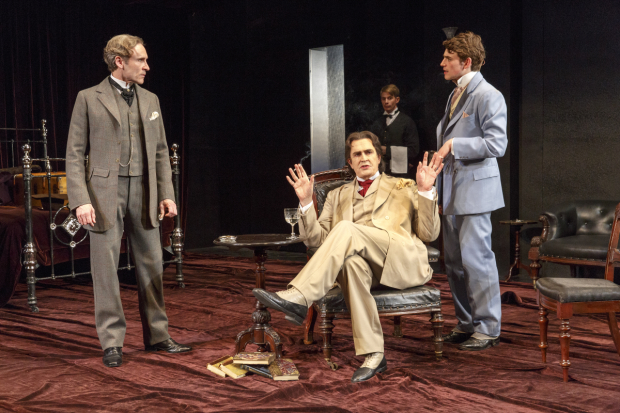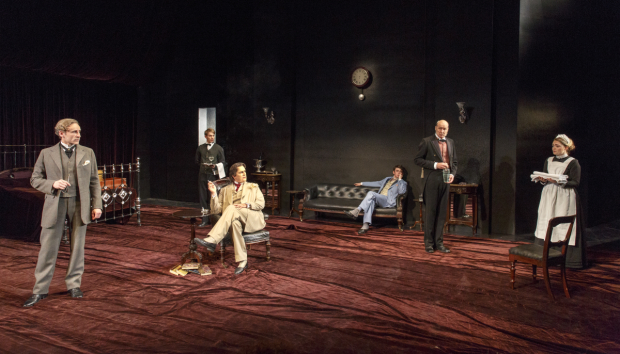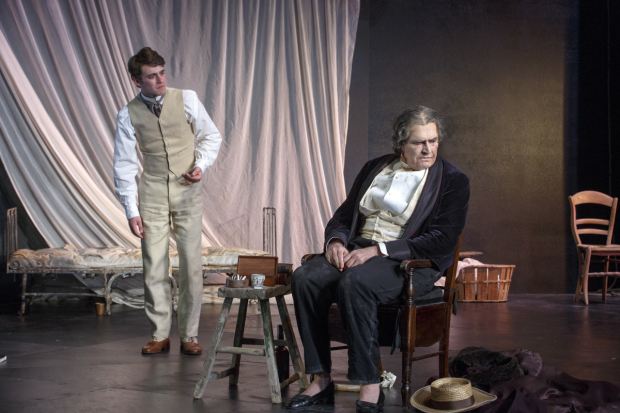The Judas Kiss

(© Richard Termine)
"My wallpaper and I are fighting a duel to the death," Irish poet and playwright Oscar Wilde is rumored to have remarked on his deathbed. "One or the other of us has to go." Dale Ferguson's funereal set for Neil Armfield's dark and heavy production of David Hare's The Judas Kiss at BAM's Harvey Theater seems to recall this oft-disputed quote. As with those famous last words, we wonder throughout the play if we are encountering a counterfeit Wilde, especially as portrayed by Rupert Everett (Blithe Spirit). Could this martyr of homosexual suffering really be the legendary wit behind The Importance of Being Earnest?
Granted, the setting and tone of Hare's play (which debuted on Broadway in 1998 and starred Liam Neeson) lends itself to severity. The first act takes place in the Cadogan Hotel, just hours before Wilde's arrest for "Gross Indecency." Wilde's ex-lover and best friend, Robert Ross (Cal MacAninch), has arranged a final meeting between Wilde (Everett) and his current lover, Lord Alfred Douglas (Charlie Rowe). Ross insists that Wilde flee the country, but Douglas (who everyone calls "Bosie") wants him to stay and fight. Of course, Bosie is very much the cause of Wilde's current predicament: It was his wrathful father who accused Wilde of "posing as a sodomite," leading Wilde to file the failed libel case that has now transformed into his criminal prosecution.
With a furtive smile and a sassy flick of his wrists, Rowe easily embodies the beautiful and pampered aristocrat whistling past the graveyard. MacAninch is far graver as Ross, exhibiting a real fear for his old friend. Infuriatingly, it's a concern that can easily be dismissed as the jealousy of an old lover left for a younger model. Robbie and Bosie's barely contained disdain for one another feels quite real.

(© Richard Termine)
Their confrontations take place in a darkly upholstered room. Ferguson hangs heavy maroon fabric from black walls. The cloth continues onto the floor, creating a very wrinkly carpet under a sharp-looking metal bedframe. Bosie's sky blue double-breasted jacket vibrantly pops out of this dingy frame (authentic period costumes by Sue Blane). So does Wilde's tan suit, the one bit of lightness around his being.
Matching the drapes, Everett portrays a particularly gloomy Wilde, growling his lines and inhaling through his teeth to produce a hissing noise. Practically unrecognizable in a fat suit and pounds of makeup, Everett's Wilde is tragically gouty even before his incarceration. Certainly, Hare envisions a poet in crisis, but he also gives him a considerable amount of gallows humor, which could be used as an opportunity to inject some levity. After all, this is a man accustomed to being the glittering center of attention at every party.
Frustratingly, Everett never seizes this possibility, delivering every laugh line with the unadulterated bitterness of straight-up Campari. This may be the result of the actor's personal reverence for Wilde: In recent interviews, Everett has described him as "a kind of Christ figure" and "like a patron saint."
This Catholic approach to the story manifests itself in Armfield's staging. The three men often pose like figures in in a religious tapestry, with Rick Fisher's dramatic lighting completing the picture: Light spills through an open window, illuminating the rich and oily stage like a Caravaggio painting. Alan John's gorgeous original music (flirty piano, passionate strings) plays over this picturesque scene, helping us to understand Wilde's love for sheer, unexplained beauty.
Actor Tom Colley accomplishes this job in the second act (which takes place in Naples, following Wilde's release from two years of hard labor at Reading Gaol), playing the naked and unashamed Italian fisherman, Galileo. He sits on the floor, an amused smile creeping across his face, as he listens to the two English queens bicker. Bosie has invited Wilde to Italy, but we get the sense that this is more of fantasy exile for him, rather than the real thing — and he's getting bored.

(© Richard Termine)
Despite the sunny Mediterranean climate, the scene is still dominated by oppressive black walls. Ferguson attempts to offset this with a flowing sheer white sheet center stage, but the stage still looks like a dungeon in a monastery. Everett's Wilde is no less dour, driving this play home to its inevitably depressing conclusion with his unrelenting scowl.
We know about Wilde's tragic end, but we have a hard time believing that he took it so tragically the whole time. In so thoroughly canonizing Wilde, Hare and Armfield rob him of that which makes him so special: His irreverent wit and propensity to treat all serious things of life with sincere and studied triviality. Worse, it gives Wilde no real emotional journey, rendering this drama not just depressing, but sleepy. We cannot see the lengths society goes to break this fay and extraordinary personality when he enters the stage already a broken man.











